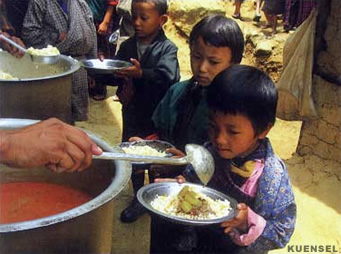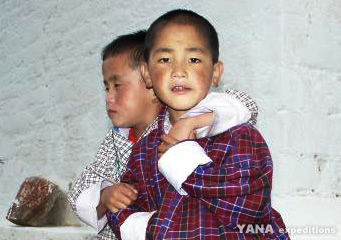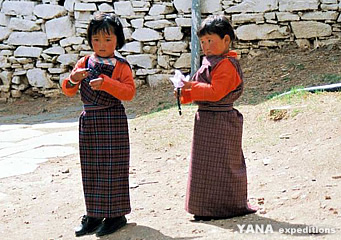 |
Bhutan's Development |
 |
Bhutan Information |
|
|
 |
| World
Food Programme in Bhutan |
 |
|
Burden
on government after WFP exit
|
 |
 |
| WFP School Feeding Programme |
| After
more than three decades of helping poor Bhutanese students attend schools
by providing them free meals, the World Food Program (WFP) will phase
out food and other assistance to schools by 2015, according to its
officials.
The
move is expected to put fresh financial challenges on the government to
provide food assistance to some 40,000 Bhutanese students who are dependent
on WFP help today. |
|
"Bhutan
is growing into a prosperous country as its socio economic indicators show,"
said the WFP programme officer in Bhutan, Ms. Naoe Yakiya. "It's not justifiable
for WFP to stay here forever."
Ms.
Naoe Yakiya said that starting in 2008, food assistance for Class XI and
XII would be stopped, and in the following year for Class IX and X as well.
Ten middle secondary schools would, however, be given food assistance up
to the end of 2009 because of Bhutan's government request, Ms. Naoe Yakiya
said.
WFP's
statistics show that it is helping 197 schools with more than 40,000 students
in 2008. While assistance to 25 primary schools would be stopped completely
or partially next year, the Department of School Education officials say
that 39 primary schools with about 3,500 students, which were previously
not receiving food, would receive WFP assistance.
"This
is because some remote areas in Bhutan still face food insecurity, and
WFP's plan for the next five years and beyond will be to assist the primary
school education in these areas," said Ms. Naoe Yakiya.
The
39 schools were identified based on the vulnerability of the area to food
insecurity and the walking distance from home to school, according to officials
from the department of school education.
The
WFP will spend US$10 million, in the next five years, in feeding students
and building hostels and kitchens for these students who are in the east
and south region. Students there come from far-flung areas and are put
up in temporary huts, WFP officials say, with no proper hygiene or security,
especially for girls.
The
government spends Nu. 240 a student a month, in various lower secondary,
middle secondary and higher secondary boarding schools, as expenses for
a single meal a day which it provides to the students. Once WFP, which
provides two meals a day out of the three, withdraws its support the government
will have to bear a monthly expense of Nu. 720 a student.
The
Department of School Education indicated that the government would be spending
about Nu. 24 million in 2009 for feeding Class IX and X students alone.
The expenses are expected to increase from Nu. 45.8 million in 2010 to
Nu. 48 million in 2011, to nearly Nu. 51 million in 2012.
The
WFP's assistance under which the national work force and rural people received
food for labour will be stopped by end of this year.
Rural
access projects and road construction works were the areas in which food
was traded for labour.
Between
1974 and 2005, the WFP has provided a total assistance of US $ 67 million
to Bhutan.
| Contributed
by Kinley Wangmo, Kuensel, Bhutan's National Newspaper 2007 |
 |
top
| Links |
 |
 |
 |
Externe Links |
|





